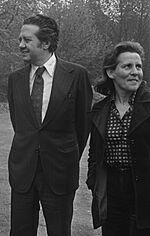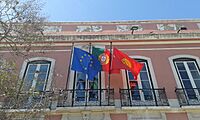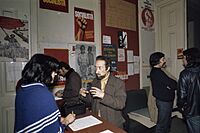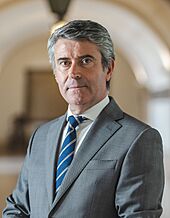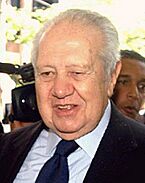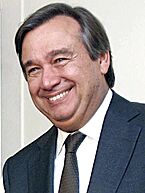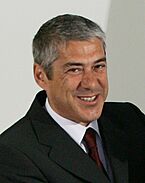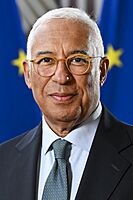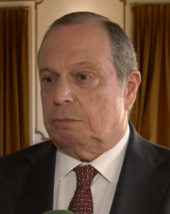Socialist Party (Portugal) facts for kids
Quick facts for kids <div style="padding-top:0.3em; padding-bottom:0.3em; border-top:2px solid Lua error in Module:European_and_national_party_data/config at line 227: attempt to index field 'data' (a nil value).; border-bottom:2px solid Lua error in Module:European_and_national_party_data/config at line 227: attempt to index field 'data' (a nil value).; line-height: 1;">
Socialist Party
Partido Socialista
|
|
|---|---|
 |
|
| Abbreviation | PS |
| President | Carlos César |
| Secretary-General | José Luís Carneiro |
| Founder | Mário Soares |
| Founded | 19 April 1973 |
| Legalised | 1 February 1975 |
| Preceded by | Acção Socialista Portuguesa |
| Headquarters | Largo do Rato 2, 1269–143 Lisbon |
| Newspaper | Acção Socialista |
| Student wing | Estudantes Socialistas |
| Youth wing | Socialist Youth |
| Women's wing | National Department of the Socialist Women |
| Membership (2023) | |
| Ideology | Social democracy |
| Political position | Centre-left |
| National affiliation | None |
| European affiliation | Party of European Socialists |
| International affiliation |
|
| European Parliament group | Progressive Alliance of Socialists and Democrats |
| Trade union affiliation | General Union of Workers |
| Colours | |
| Anthem | "A Internacional" ('The Internationale') |
| Assembly of the Republic | Lua error in Module:European_and_national_party_data/config at line 227: attempt to index field 'data' (a nil value). |
| European Parliament | Lua error in Module:European_and_national_party_data/config at line 227: attempt to index field 'data' (a nil value). |
| Regional Parliaments |
31 / 104
<div style="background-color: Lua error in Module:European_and_national_party_data/config at line 227: attempt to index field 'data' (a nil value).; width: 30%; height: 100%;">
|
| Local government (Mayors) |
148 / 308
<div style="background-color: Lua error in Module:European_and_national_party_data/config at line 227: attempt to index field 'data' (a nil value).; width: 48%; height: 100%;">
|
| Local government (Parishes) |
1,264 / 3,066
<div style="background-color: Lua error in Module:European_and_national_party_data/config at line 227: attempt to index field 'data' (a nil value).; width: 41%; height: 100%;">
|
| Election symbol | |
|
|
|
| Party flag | |
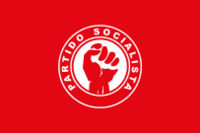 |
|
| Website | |
| Lua error in Module:European_and_national_party_data/config at line 227: attempt to index field 'data' (a nil value). | |
The Socialist Party (known as Partido Socialista in Portuguese, or PS) is a major political party in Portugal. It was started on April 19, 1973, in a German city called Bad Münstereifel. The people who founded it were part of a group called the Portuguese Socialist Action.
The PS is a member of several international groups. These include the Socialist International, the Progressive Alliance, and the Party of European Socialists. They also have members in the European Parliament.
The party won the 1976 general election. They formed Portugal's first government after the 1974 revolution. Mário Soares became the Prime Minister. The government was not very stable and ended in 1978.
The PS lost the 1979 election. But they came back to power in 1983. They formed a partnership with the Social Democratic Party. This partnership lasted two years. In 1985, the party lost again and was in opposition for 10 years.
Under António Guterres, the party won the 1995 general election. They stayed in power until 2002. Then, José Sócrates led the party to a big win in 2005. They won an absolute majority, meaning they had more than half the seats.
By 2011, Portugal faced an economic crisis. The party lost the 2011 election and went back to being in opposition. Even though they lost the 2015 election, the party made a deal with other left-wing groups. This allowed António Costa to become Prime Minister.
António Costa was Prime Minister for 9 years, until 2024. During his time, the party won two more elections. The last one, in 2022, was another absolute majority. After Costa resigned, the party lost the 2024 election by a small amount. They returned to opposition. The party lost again in the 2025 election by a larger amount. They even fell to third place in Parliament.
The Socialist Party is a centre-left party. It is one of the three main parties in Portuguese politics. Their main rivals are the Social Democratic Party (PSD), which is centre-right, and Chega (CH), which is far-right. As of June 2025, the party leader is José Luís Carneiro.
Party History
Early Years: Portuguese Socialist Action (1964–1973)
The Portuguese Socialist Action (ASP) was started in November 1964. This happened in Geneva, Switzerland. Key founders were Mário Soares, Manuel Tito de Morais, and Francisco Ramos da Costa.
The ASP was formed by Socialists who were living outside Portugal. This was because political groups were not allowed under Salazar's government, called the Estado Novo. In 1964, Mário Soares became the leader of the ASP. The group agreed on its main ideas and values.
The Socialist Party (PS) was officially created on April 19, 1973. This happened at a meeting of the ASP in Bad Münstereifel, West Germany.
| Choice | Votes | % | |
|---|---|---|---|
| For creating a party | 20 | 74.1 | |
| Against creating a party | 7 | 25.9 | |
| Total Voters | 27 | ||
| Source: | |||
The 27 people at the meeting decided to create a party. This party would focus on socialism and political freedom. They wanted a society where everyone was equal. They also looked to Marxism for ideas. However, seven people voted against starting a party, including Mário Soares' wife, Maria Barroso.
Socialist Party: From 1973 to Today
On April 25, 1974, the Carnation Revolution happened. This event ended the strict Estado Novo government. Democracy returned to Portugal. Mário Soares, the party's General-Secretary, came back from living in France. He became the Minister of Foreign Affairs.
After the revolution, elections were held. The PS won the 1975 election for the group that wrote the new constitution. They also won the 1976 elections for the National Assembly. But they lost to the Democratic Alliance (AD) in the 1979 election.
In 1980, the PS formed an election partnership called the Republican and Socialist Front. This group tried to defeat the AD but did not succeed.
The PS won the 1983 general election. But they did not win an absolute majority. So, the PS formed a big partnership with the centre-right Social Democratic Party (PSD). This was called the Central Block. This new government started talks for Portugal to join the European Economic Community (EEC), which is now the European Union.
In 1985, the Central Block ended. The PS, led by António de Almeida Santos, lost the 1985 election. The PSD, led by Cavaco Silva, won the elections in 1985, 1987, and 1991. The PS was in opposition for more than ten years.
In the 1995 election, the PS, led by António Guterres, won a general election for the first time in twelve years. In the 1999 election, they almost won an absolute majority, missing it by just one member of parliament. In 2001, after losing many local elections, Guterres resigned as prime minister. New elections were called for 2002.
The Socialist Party lost the 2002 general election by a small amount to the PSD. The PSD then formed a government with the People's Party. During this time, some people said the Socialist Party became more centrist.
In June 2004, the PS won the 2004 European elections by a large amount. A few weeks later, Durão Barroso, the PSD leader and prime minister, resigned. He became the President of the European Commission. In December 2004, the President of Portugal, Jorge Sampaio, called for new elections in February 2005.
These elections resulted in a huge win for the PS. For the first time ever, they won an absolute majority. José Sócrates, the PS leader, became Prime Minister.
In 2009, after four and a half years in power, the PS lost the 2009 European Parliament elections to the PSD. However, they won the general election on September 27, 2009. But they did not win another absolute majority. The PS later made same-sex marriage legal.
The Eurozone crisis and financial crisis of 2011 hit Portugal very hard. Sócrates' government had to put in place tough measures to save money. On March 23, 2011, all the other parties in Parliament said no to the government's new plans. Because of this, Sócrates resigned as prime minister. A new election was held on June 5, 2011.
In these elections, the PS had a big loss. They got 28.1 percent of the votes, ten points behind the PSD. The PSD then formed another government with the People's Party. Sócrates resigned as General-Secretary on election night. This was the PS's worst result since 1987. On July 23, 2011, António José Seguro was chosen as the new leader.
Under Seguro's leadership, the PS won the 2013 local elections. They gained many seats from the PSD. The Socialists also won the European elections in May 2014, but by a small margin. They got 31.5 percent of the votes. Many PS members were disappointed with this result.
On May 27, António Costa, who was the mayor of Lisbon at the time, announced he would run for the PS leadership. Seguro did not want to call a new meeting or election for the leader. Instead, he called for a special election on September 28 to choose the party's candidate for prime minister in the 2015 general elections. Costa easily won against Seguro.
In the 2015 legislative elections, the PS came in second place. They got 32 percent of the votes. The PSD/CDS-PP group won with 38.6 percent. Even though the PSD/CDS-PP won, the centre-left and left-wing parties together had more seats in the Portuguese parliament.
After the PSD/CDS-PP government lost a vote in parliament, the PS made a deal with the Left Bloc and the Unitary Democratic Coalition. This allowed a PS minority government to be formed. For the first time in Portugal's democracy, the leader of the party that came in second place became prime minister.
To avoid financial problems, in 2017, the party voted to remove limits on how much money parties could raise. This opened up all Portuguese parties to private donations. They did not have to say who gave them money. The Portuguese president, Marcelo Rebelo de Sousa, approved this new rule.
Costa had a very successful first term as prime minister. The economy grew, unemployment was low, and the government spent less than it earned. Even though he led a more left-leaning PS, Costa started to move the party back to the centre in 2018. Some younger, more left-wing members, like minister Pedro Nuno Santos, did not agree with this.
In the 2019 European elections, the PS won a big victory. They got 33.4 percent of the votes, while the PSD got 22 percent. The PS also won the October 2019 general election with 36 percent of the votes. This was against the PSD's 28 percent. The second Costa government started on October 26, 2019.
In October 2020, the PS lost power in the Azores region. This happened after they lost their majority in the region's 2020 elections. The PS got only 39 percent of the votes and 25 seats. Right-wing parties won more seats and formed a government. As of 2021, the PS was in opposition in both of Portugal's autonomous regions.
For the 2021 Portuguese presidential election, Costa supported the current president, Marcelo Rebelo de Sousa. Some party members were not happy about this. Former PS member of the European Parliament, Ana Gomes, ran for president. She said she was the candidate for democratic socialism. She was disappointed that the party did not have an official candidate. Gomes finished in second place behind de Sousa.
The party had a setback in the 2021 local elections. They lost several cities to the PSD. The biggest loss was Lisbon, where the PSD candidate, Carlos Moedas, won against Fernando Medina by a small amount. After the local elections, there were disagreements between the PS and its left-wing partners. This led to the 2022 budget being rejected. This forced a new election for January 2022.
Even though polls predicted a close race, the Socialists won a surprise absolute majority. This was only the second time in their history. They got 41 percent of the votes and 120 out of 230 seats in the Portuguese parliament.
In November 2023, António Costa resigned as prime minister and party leader. This happened because of an investigation into suspected issues with contracts for lithium and hydrogen businesses. After Costa's decision, an early election was called for March 10, 2024. A leadership election was held on December 15 and 16, 2023. Pedro Nuno Santos won with almost 61 percent of the votes.
In the March 10, 2024 election, the Socialist Party was narrowly defeated by the Democratic Alliance (AD). The PS lost 42 seats and got 28 percent of the votes. Three months later, in the 2024 European Parliament elections, the Socialist Party narrowly won against the AD group.
A new election was called for May 2025. This happened after a vote of confidence in the AD government was rejected. The party had one of its worst results ever in this election. They got less than 23 percent of the votes and 58 seats. They fell to third place in Parliament, behind the far-right Chega party. Pedro Nuno Santos resigned. José Luís Carneiro became the party leader in late June 2025.
Party Ideas and Groups
The PS is a main centre-left party. It is a social democratic party. This means it believes in a fair society where the government helps people. It has different groups inside it. These groups range from democratic socialism to social liberalism and centrism.
The party supports Keynesian economics, which means the government should spend money to help the economy. They also support Europeanism, meaning they believe in working closely with other European countries. They are also progressive, meaning they want to make society better and fairer. Like many social democratic parties, it has sometimes followed a "Third Way" approach. This means it tries to find a middle ground between traditional socialism and free-market ideas.
In its early years, the party also had some far-left groups. For example, the Marxist Manuel Serra was against Mário Soares' leadership. He later left the party. Some members were even described as having "trotskyist" ideas.
Election Results
Assembly of the Republic
How many seats the Socialist Party won in Portuguese legislative elections

| Election | Leader | Votes | % | Seats | +/- | Government |
|---|---|---|---|---|---|---|
| 1975 | Mário Soares | 2,162,972 | 37.9 (#1) |
116 / 250
|
New | Constituent assembly |
| 1976 | 1,912,921 | 34.9 (#1) |
107 / 263
|
Minority | ||
| Coalition | ||||||
| Opposition | ||||||
| 1979 | 1,642,136 | 27.3 (#2) |
74 / 250
|
Opposition | ||
| 1980 | Republican and Socialist Front |
66 / 250
|
Opposition | |||
| 1983 | 2,061,309 | 36.1 (#1) |
94 / 250
|
Coalition | ||
| 1985 | António de Almeida Santos | 1,204,321 | 20.8 (#2) |
57 / 250
|
Opposition | |
| 1987 | Vítor Constâncio | 1,262,506 | 22.2 (#2) |
60 / 250
|
Opposition | |
| 1991 | Jorge Sampaio | 1,670,758 | 29.1 (#2) |
72 / 230
|
Opposition | |
| 1995 | António Guterres | 2,583,755 | 43.8 (#1) |
112 / 230
|
Minority | |
| 1999 | 2,385,922 | 44.1 (#1) |
115 / 230
|
Minority | ||
| 2002 | Eduardo Ferro Rodrigues | 2,068,584 | 37.8 (#2) |
96 / 230
|
Opposition | |
| 2005 | José Sócrates | 2,588,312 | 45.0 (#1) |
121 / 230
|
Majority | |
| 2009 | 2,077,238 | 36.6 (#1) |
97 / 230
|
Minority | ||
| 2011 | 1,566,347 | 28.1 (#2) |
74 / 230
|
Opposition | ||
| 2015 | António Costa | 1,747,685 | 32.3 (#2) |
86 / 230
|
Opposition | |
| Minority | ||||||
| 2019 | 1,903,687 | 36.3 (#1) |
108 / 230
|
Minority | ||
| 2022 | 2,302,601 | 41.4 (#1) |
120 / 230
|
Majority | ||
| 2024 | Pedro Nuno Santos | 1,812,443 | 28.0 (#2) |
78 / 230
|
Opposition | |
| 2025 | 1,442,546 | 22.8 (#2) |
58 / 230
|
Opposition | ||
Presidential Elections
| Election | Candidate | Votes | % | Result |
|---|---|---|---|---|
| 1976 | Supported António Ramalho Eanes | |||
| 1980 | Supported António Ramalho Eanes | |||
| 1986 | Mário Soares | 1,443,683 | 25.4 (#2) | Won |
| 1991 | 3,459,521 | 70.4 (#1) | Won |
|
| 1996 | Jorge Sampaio | 3,035,056 | 53.9 (#1) | Won |
| 2001 | 2,401,015 | 55.6 (#1) | Won |
|
| 2006 | Mário Soares | 785,355 | 14.3 (#3) | Lost |
| 2011 | Manuel Alegre | 831,838 | 19.7 (#2) | Lost |
| 2016 | No candidate | |||
| 2021 | No candidate | |||
European Parliament Elections
| Election | Leader | Votes | % | Seats | +/- | EP Group |
|---|---|---|---|---|---|---|
| 1987 | Maria de Lourdes Pintasilgo | 1,267,672 | 22.5 (#2) |
6 / 24
|
New | SOC |
| 1989 | João Cravinho | 1,184,380 | 28.5 (#2) |
7 / 24
|
||
| 1994 | António Vitorino | 1,061,560 | 34.9 (#1) |
10 / 25
|
PES | |
| 1999 | Mário Soares | 1,493,146 | 43.1 (#1) |
12 / 25
|
||
| 2004 | António Costa | 1,516,001 | 44.5 (#1) |
12 / 24
|
||
| 2009 | Vital Moreira | 946,818 | 26.5 (#2) |
7 / 22
|
S&D | |
| 2014 | Francisco Assis | 1,033,158 | 31.5 (#1) |
8 / 21
|
||
| 2019 | Pedro Marques | 1,104,694 | 33.4 (#1) |
9 / 21
|
||
| 2024 | Marta Temido | 1,268,915 | 32.1 (#1) |
8 / 21
|
Regional Assemblies
| Region | Election | Leader | Votes | % | Seats | +/- | Government |
|---|---|---|---|---|---|---|---|
| Azores | 2024 | Vasco Cordeiro | 41,538 | 35.9 (#2) |
23 / 57
|
Opposition | |
| Madeira | 2025 | Paulo Cafôfo | 22,351 | 15.6 (#3) |
8 / 47
|
Opposition |
Important Party Leaders
Secretaries-General
- Mário Soares: April 19, 1973 – June 29, 1986
- António de Almeida Santos (temporary): June 13, 1985 – November 13, 1985
- António Macedo (temporary): November 13, 1985 – June 29, 1986
- Vítor Constâncio: June 29, 1986 – January 16, 1989
- Jorge Sampaio: January 16, 1989 – February 23, 1992
- António Guterres: February 23, 1992 – January 19, 2002
- Eduardo Ferro Rodrigues: January 19, 2002 – September 27, 2004
- José Sócrates: September 27, 2004 – July 23, 2011
- António José Seguro: July 23, 2011 – September 28, 2014
- Maria de Belém Roseira (temporary): September 28, 2014 – November 22, 2014
- António Costa: November 22, 2014 – January 7, 2024
- Pedro Nuno Santos: January 7, 2024 – May 24, 2025
- Carlos César (temporary): May 24, 2025 – June 28, 2025
- José Luís Carneiro: June 28, 2025 – present
Timeline of Leaders
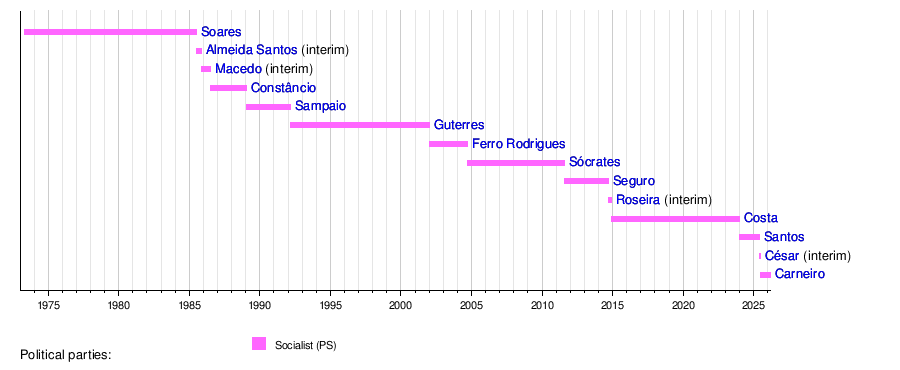
-
Mário Soares, founder, Prime Minister (1976–1978, 1983–1985), and President (1986–1996).
-
António Guterres, Prime Minister from 1995 to 2002 and the 9th Secretary-General of the United Nations since 2017.
-
José Sócrates, the party's Secretary-General (2004–2011) and Prime Minister (2005–2011).
-
António Costa, Prime Minister from 2015 to 2024 and the fourth President of the European Council since 2024.
Party Presidents
- António Macedo: April 19, 1973 – June 29, 1986
- Manuel Tito de Morais: June 29, 1986 – January 14, 1989
- João Ferraz de Abreu: January 14, 1989 – February 21, 1992
- António de Almeida Santos: February 21, 1992 – September 9, 2011
- Maria de Belém Roseira: September 9, 2011 – November 29, 2014
- Carlos César: November 29, 2014 – present
Presidents of the Assembly
- Henrique de Barros: June 3, 1975 – April 2, 1976
- Vasco da Gama Fernandes: July 29, 1976 – October 29, 1978
- Teófilo Carvalho dos Santos: October 30, 1978 – January 7, 1980
- Manuel Tito de Morais: June 8, 1983 – October 24, 1984
- António de Almeida Santos: October 31, 1995 – April 4, 2002
- Jaime Gama: March 16, 2005 – June 21, 2011
- Eduardo Ferro Rodrigues: October 23, 2015 – March 29, 2022
- Augusto Santos Silva: March 29, 2022 – March 25, 2024
Parliamentary Leaders
- António Lopes Cardoso (Beja): 1975–1976
- Salgado Zenha (Porto): 1976–1983
- Walter Rosa (Lisbon): 1983–1985
- José Luís Nunes (Porto): 1985–1986
- João Ferraz de Abreu (Aveiro): 1986–1987
- Jorge Sampaio (Lisbon): 1986–1988
- António Guterres (Castelo Branco): 1988–1991
- Jaime Gama (Lisbon): 1991–1994
- António de Almeida Santos (Porto): 1992–1993
- Jorge Lacão (Santarém): 1995–1996
- Francisco Assis (Porto) (1st time): 1997–2002
- António Costa (Leiria): 2002–2003
- António José Seguro (Lisbon): 2004–2005
- Alberto Martins (Porto) (1st time): 2005–2009
- Francisco Assis (Porto) (2nd time): 2009–2011
- Maria de Belém Roseira (Lisbon): 2011
- Carlos Zorrinho (Évora): 2011–2013
- Alberto Martins (Porto) (2nd time): 2013–2014
- Eduardo Ferro Rodrigues (Lisbon): 2014–2015
- Carlos César (Azores): 2015–2019
- Ana Catarina Mendes (Setúbal): 2019–2022
- Eurico Brilhante Dias (Leiria) (1st time): 2022–2024
- Alexandra Leitão (Santarém): 2024 – 2025
- Pedro Delgado Alves (Coimbra): 2025
- Eurico Brilhante Dias (Leiria) (2nd time): 2025–present
Prime Ministers from the Party
- Mário Soares: July 23, 1976 – August 28, 1978; June 9, 1983 – November 6, 1985
- António Guterres: October 28, 1995 – April 6, 2002
- José Sócrates: March 12, 2005 – June 21, 2011
- António Costa: November 26, 2015 – April 2, 2024
Regional Government Presidents (Azores)
- Carlos César: November 9, 1996 – November 6, 2012
- Vasco Cordeiro: November 6, 2012 – November 24, 2020
Presidents of Portugal from the Party
- Mário Soares: March 9, 1986 – March 9, 1996
- Jorge Sampaio: March 9, 1996 – March 9, 2006
See also
- Politics of Portugal
- Socialist Party
 | Victor J. Glover |
 | Yvonne Cagle |
 | Jeanette Epps |
 | Bernard A. Harris Jr. |


